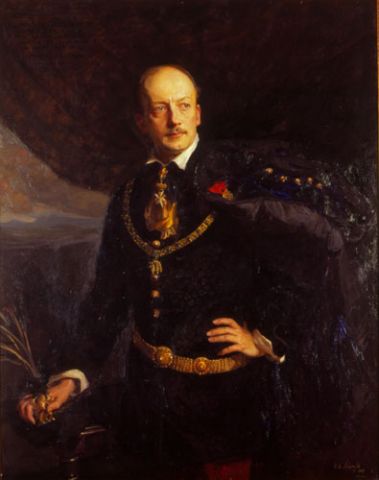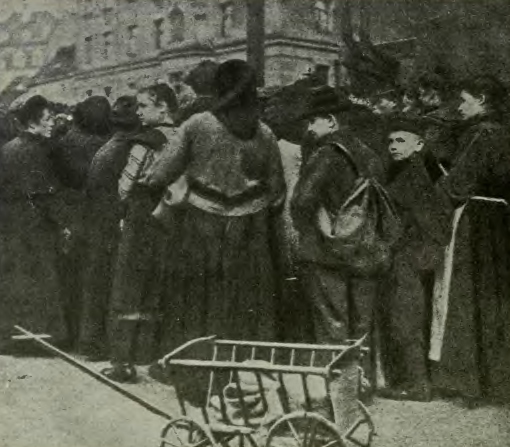|
History Of Germany During World War I
During World War I, the German Empire was one of the Central Powers. It began participation in the conflict after the declaration of war against Serbia by its ally, Austria-Hungary. German forces fought the Allies on both the eastern and western fronts, although German territory itself remained relatively safe from widespread invasion for most of the war, except for a brief period in 1914 when East Prussia was invaded. A tight blockade imposed by the Royal Navy caused severe food shortages in the cities, especially in the winter of 1916–17, known as the Turnip Winter. At the end of the war, Germany's defeat and widespread popular discontent triggered the German Revolution of 1918–1919 which overthrew the monarchy and established the Weimar Republic. Overview The German population responded to the outbreak of war in 1914 with a complex mix of emotions, in a similar way to the populations in other countries of Europe; notions of overt enthusiasm known as the Spirit of 1914 ha ... [...More Info...] [...Related Items...] OR: [Wikipedia] [Google] [Baidu] |
World War I
World War I (28 July 1914 11 November 1918), often abbreviated as WWI, was one of the deadliest global conflicts in history. Belligerents included much of Europe, the Russian Empire, the United States, and the Ottoman Empire, with fighting occurring throughout Europe, the Middle East, Africa, the Pacific, and parts of Asia. An estimated 9 million soldiers were killed in combat, plus another 23 million wounded, while 5 million civilians died as a result of military action, hunger, and disease. Millions more died in genocides within the Ottoman Empire and in the 1918 influenza pandemic, which was exacerbated by the movement of combatants during the war. Prior to 1914, the European great powers were divided between the Triple Entente (comprising France, Russia, and Britain) and the Triple Alliance (containing Germany, Austria-Hungary, and Italy). Tensions in the Balkans came to a head on 28 June 1914, following the assassination of Archduke Franz Ferdin ... [...More Info...] [...Related Items...] OR: [Wikipedia] [Google] [Baidu] |
France
France (), officially the French Republic ( ), is a country primarily located in Western Europe. It also comprises of Overseas France, overseas regions and territories in the Americas and the Atlantic Ocean, Atlantic, Pacific Ocean, Pacific and Indian Oceans. Its Metropolitan France, metropolitan area extends from the Rhine to the Atlantic Ocean and from the Mediterranean Sea to the English Channel and the North Sea; overseas territories include French Guiana in South America, Saint Pierre and Miquelon in the North Atlantic, the French West Indies, and many islands in Oceania and the Indian Ocean. Due to its several coastal territories, France has the largest exclusive economic zone in the world. France borders Belgium, Luxembourg, Germany, Switzerland, Monaco, Italy, Andorra, and Spain in continental Europe, as well as the Kingdom of the Netherlands, Netherlands, Suriname, and Brazil in the Americas via its overseas territories in French Guiana and Saint Martin (island), ... [...More Info...] [...Related Items...] OR: [Wikipedia] [Google] [Baidu] |
Leopold Berchtold
Leopold Anton Johann Sigismund Josef Korsinus Ferdinand Graf Berchtold von und zu Ungarschitz, Frättling und Püllütz ( hu, Gróf Berchtold Lipót, cs, Leopold hrabě Berchtold z Uherčic) (18 April 1863 – 21 November 1942) was an Austro-Hungarian politician, diplomat and statesman who served as Imperial Foreign Minister at the outbreak of World War I. Life Career Born in Vienna on 18 April 1863 into a wealthy noble family that owned lands in Moravia and Hungary, he was reputed to be one of Austria-Hungary's richest men. Tutored at home, he later studied law and joined the Austro-Hungarian foreign service in 1893. In the same year, he married Countess Ferdinanda Károlyi (1868–1955), the daughter of one of the richest aristocrats in Hungary, in Budapest. He subsequently served at the embassies in Paris (1894), London (1899) and St. Petersburg (1903). In December 1906, Count Berchtold was appointed as the successor of Count Lexa von Aehrenthal as Ambassador to Russia ... [...More Info...] [...Related Items...] OR: [Wikipedia] [Google] [Baidu] |
July Crisis
The July Crisis was a series of interrelated diplomatic and military escalations among the major powers of Europe in the summer of 1914, Causes of World War I, which led to the outbreak of World War I (1914–1918). The crisis began on 28 June 1914, when Gavrilo Princip, a Bosnian Serb, Assassination of Archduke Franz Ferdinand, assassinated Archduke Franz Ferdinand, heir presumptive to the Austro-Hungarian throne, and his wife Sophie, Duchess of Hohenberg. The assassin team was armed, trained, smuggled across the border and instructed by the head of the Serbian military intelligence service and his staff. A complex web of alliances, coupled with miscalculations when many leaders regarded war as in their best interests or felt that a general war would not occur, resulted in a general outbreak of hostilities among most major European nations in early August 1914. Austria-Hungary viewed the irredentist movements of South Slavs, as promoted by Kingdom of Serbia, Serbia, as a threat ... [...More Info...] [...Related Items...] OR: [Wikipedia] [Google] [Baidu] |
Schlieffen Plan
The Schlieffen Plan (german: Schlieffen-Plan, ) is a name given after the First World War to German war plans, due to the influence of Field Marshal Alfred von Schlieffen and his thinking on an invasion of France and Belgium, which began on 4 August 1914. Schlieffen was Chief of the General Staff of the German Army from 1891 to 1906. In 1905 and 1906, Schlieffen devised an army deployment plan for a decisive (war-winning) offensive against the French Third Republic. German forces were to invade France through the Netherlands and Belgium rather than across the common border. After losing the First World War, German official historians of the and other writers described the plan as a blueprint for victory. (Colonel-General) Helmuth von Moltke the Younger succeeded Schlieffen as Chief of the German General Staff in 1906 and was dismissed after the First Battle of the Marne (5–12 September 1914). German historians claimed that Moltke had ruined the plan by meddling with it, ou ... [...More Info...] [...Related Items...] OR: [Wikipedia] [Google] [Baidu] |
Theobald Von Bethmann-Hollweg In Uniform, 1915
Theobald is a Germanic dithematic name, composed from the elements '' theod-'' "people" and ''bald'' "bold". The name arrived in England with the Normans. The name occurs in many spelling variations, including Theudebald, Diepold, Theobalt, Tybalt; in French Thibaut, Thibault, Thibeault, Thiébaut, etc.; in Italian Tebaldo; in Spanish and Portuguese Teobaldo; in Irish Tiobóid; in Czech Děpolt; and in Hungarian Tibold. People called Theobald include: *Saint Theobald of Dorat (990–1070), French saint *Saint Theobald of Marly (died 1247), French saint and Cistercian abbot *Saint Theobald of Provins (1033–1066), French hermit and saint * Theobald of Langres (12th century), number theorist *Theobald I, Duke of Lorraine (c. 1191–1220), the Duke of Lorraine (1213–1220) *Theobald II, Duke of Lorraine (1263–1312), the Duke of Lorraine (1303–1312) *Theobald I, Count of Blois (913–975), the first Count of Blois, Chartres, and Châteaudun, as well as Count of Tours *Theobal ... [...More Info...] [...Related Items...] OR: [Wikipedia] [Google] [Baidu] |
Schweinemord
In 1915, due to World War I food restrictions and rationing, the German bureaucracy decided to regard pigs The pig (''Sus domesticus''), often called swine, hog, or domestic pig when distinguishing from other members of the genus '' Sus'', is an omnivorous, domesticated, even-toed, hoofed mammal. It is variously considered a subspecies of ''Sus s ... as co-eaters with humans and tried to preserve supplies. As a result, five million pigs were massacred in the so-called Schweinemord (German: pig massacre) to both make food and preserve grain. However it did little to increase the supply of grain, as officials did not take into account the use of pig manure as fertilizer on small farms. Because of this, killing the pigs actually decreased crop yields in the region. References *Roger Chickering: ''Das Deutsche Reich und der Erste Weltkrieg'', C.H.Beck, , P. 5Online*Cove, Dennis and Westwel, Ian ed. ''History of World War I: the Home Fronts, Technologies of the War'', , P. 6 ... [...More Info...] [...Related Items...] OR: [Wikipedia] [Google] [Baidu] |
Food Prices
Food prices refer to the average price level for food across countries, regions and on a global scale. Food prices have an impact on producers and consumers of food. Price levels depend on the food production process, including food marketing and food distribution. Fluctuation in food prices is determined by a number of compounding factors. Geopolitical events, global demand, exchange rates, government policy, diseases and crop yield, energy costs, availability of natural resources for agriculture, food speculation, changes in the use of soil and weather events have a direct impact on the increase or decrease of food prices. The consequences of food price fluctuation are multiple. Increases in food prices, or agflation, endangers food security, particularly for developing countries, and can cause social unrest. Increases in food prices is related to disparities in diet quality and health, particularly among vulnerable populations, such as women and children. Food prices will o ... [...More Info...] [...Related Items...] OR: [Wikipedia] [Google] [Baidu] |
Blockade Of Germany
The Blockade of Germany, or the Blockade of Europe, occurred from 1914 to 1919. The prolonged naval blockade was conducted by the Allies of World War I, Allies during and after World War I in an effort to restrict the maritime supply of goods to the Central Powers, which included German Empire, Germany, Austria-Hungary and the Ottoman Empire. The blockade is considered one of the key elements in the eventual Allied victory in the war. The German Board of Public Health in December 1918 claimed that 763,000 German civilians had already died from starvation and disease, caused by the blockade.C. Paul Vincent, ''The Politics of Hunger: the Allied Blockade of Germany, 1915–1919''. Athens, Ohio: Ohio University Press, 1985. p. 141 An academic study done in 1928 put the death toll at 424,000. An additional 100,000 people may have died during the post-armistice continuation of the blockade in 1919. Both Germany and the United Kingdom relied heavily on imports to feed their population ... [...More Info...] [...Related Items...] OR: [Wikipedia] [Google] [Baidu] |
Second International
The Second International (1889–1916) was an organisation of socialist and labour parties, formed on 14 July 1889 at two simultaneous Paris meetings in which delegations from twenty countries participated. The Second International continued the work of the dissolved First International, though excluding the powerful anarcho-syndicalist movement. While the international had initially declared its opposition to all warfare between European powers, most of the major European parties ultimately chose to support their respective states in World War I. After splitting into pro-Allied, pro-Central Powers, and antimilitarist factions, the international ceased to function. After the war, the remaining factions of the international went on to found the Labour and Socialist International, the International Working Union of Socialist Parties, and the Communist International. History Pre-foundation conferences (1881–1889) The foundation of a new international was first discussed at ... [...More Info...] [...Related Items...] OR: [Wikipedia] [Google] [Baidu] |
Reichstag (German Empire)
The Reichstag () of the German Empire was Germany's lower house of parliament from 1871 to 1918. Within the governmental structure of the Reich, it represented the national and democratic element alongside the federalism of the Bundesrat and the monarchic and bureaucratic element of the executive, embodied in the Reich chancellor. Together with the Bundesrat, the Reichstag had legislative power and shared in decision-making on the Reich budget. It also had certain rights of control over the executive branch and could engage the public through its debates. The emperor had little political power, and over time the position of the Reichstag strengthened with respect to the Bundesrat. Reichstag members were elected for three year terms from 1871 to 1888 and following that for five years. It had one of the most progressive electoral laws of its time: with only a few restrictions, all men 25 and older were allowed to vote, secretly and equally. The Reichstag met throughout the First Wo ... [...More Info...] [...Related Items...] OR: [Wikipedia] [Google] [Baidu] |
Social Democratic Party Of Germany
The Social Democratic Party of Germany (german: Sozialdemokratische Partei Deutschlands, ; SPD, ) is a centre-left social democratic political party in Germany. It is one of the major parties of contemporary Germany. Saskia Esken has been the party's leader since the 2019 leadership election together with Lars Klingbeil, who joined her in December 2021. After Olaf Scholz was elected chancellor in 2021 the SPD became the leading party of the federal government, which the SPD formed with the Greens and the Free Democratic Party, after the 2021 federal election. The SPD is a member of 11 of the 16 German state governments and is a leading partner in seven of them. The SPD was established in 1863. It was one of the earliest Marxist-influenced parties in the world. From the 1890s through the early 20th century, the SPD was Europe's largest Marxist party, and the most popular political party in Germany. During the First World War, the party split between a pro-war mainstream ... [...More Info...] [...Related Items...] OR: [Wikipedia] [Google] [Baidu] |






